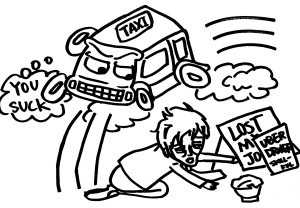Driverless cars could hurt economy
In modern society, technology has become instrumental in people’s daily routines, from the proliferation of smart phones to Wi-Fi on laptops and other devices. This new wave of technology is meant to enhance lives. But with the emergence of self-driving cars, first produced by the likes of Google and now sought by Mercedes-Benz, the ability to physically drive might become antiquated. This next technological advancement might be going too far and ignores many economic ramifications.
Today, nearly 3.5 million people work as truck drivers in America alone. If self-driving cars come to fruition, the need for trucking drivers will be completely eradicated. Instead of drivers working, a robotic car will be able to complete their jobs for them. Though those 3.5 million workers could eventually go into other trades, most will end up unemployed, earning a small stipend from the government’s unemployment program to keep them in financially stable conditions. The government simply cannot afford for those 3.5 million workers to join the unemployed and ultimately put our nation into more debt.
Additionally, taxi drivers and other related car services rely on their driving skills to earn a living. With the invention of self-driving cars, people will be able to rent a vehicle that will drive them to their destination instead of completing a personable transaction. More people will be out of work and join a government-paid program. With too many people out of work, the nation might not be able to continue paying for the unemployed, increasing homelessness rates.
Because no one will actually be operating self-driving vehicles, there will be less of a need for car insurance and automotive lawyers. People will no longer feel the need to take precautions, as they will feel protected by the self-operating car. Computers like the ones implemented in these cars are not always reliable and could crash at any given time. A computer crash could result in a major collision that could not be stopped with the simple push of the brake pedal. Furthermore, self-driving cars could be disrupted by weather conditions such as rain and snow, which could cause interference with the camera and sensor. Not only could passengers end up injured, but these accidents could also result in financial woes. Without the need for car insurance and the inevitable elimination of automotive lawyers, the passenger would be burdened with the financial repercussions.
Lastly, the purchase of one of these coveted vehicles will be nearly impossible for the average American. Today, cars are staples in the average American household. According to the National Automobile Dealers Association, the average American spends $30,000 on a new vehicle, and even less on used cars. Buyers will not be able to find a self-driving car at anywhere near this price range. In 2025, self-driving vehicles will be about $10,000 more expensive than a standard car. Additionally, since only luxury brands are beginning to produce prototypes, the cars will not be affordable for the average consumer. Without any affordable options, self-driving cars may become exclusive to the wealthy.
Despite the many benefits of self-driving cars, they simply cannot be a reality. The economic reality proves that self-driving cars are detrimental to the nation, auto companies and consumers. The United States and its people cannot afford this luxury, regardless of the perks.


hmmm…this article makes sense…computers may crash or need repair…or the motherboard may need to be replaced…and i cannot afford 1…i thought about saving $$$…i am DISABLED from a HEAD-ON CA CRASH a long time ago…it wouldtake a very long time to save $30,000! What about an ELIO? $6800…I will get an ELIO!
I’m so sick of these “ROBOTS ARE GONNA TAKE OUR JOBS” articles. Advancements in our history have always resulted in a learning curve for workers. Notice you don’t see many apothecaries around these days? How about blacksmiths, typewriter repairmen, or asbestos installers? The value of an employee is their ability to learn new skills when required. Taxi drivers who are electrically inclined can take classes and get certified to install/repair navigation equipment. Those who aren’t can pick another field. This cycle has been going on forever, and is very sustainable.
“The economic reality proves that self-driving cars are detrimental to the nation, auto companies and consumers.” Are you F’ing crazy? You didn’t prove anything, cite any sources, or do any research. You state your opinions as facts, when you have none. When irresponsible reporting on the internet becomes obsolete by people thinking for themselves, I hope you are flexible enough to learn a skill. This drivel is straight up nonesencse.